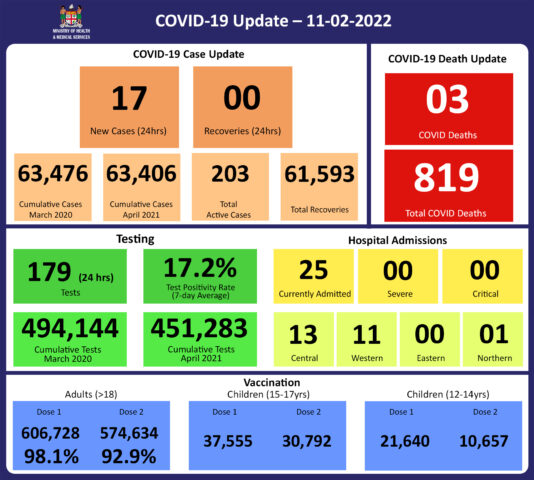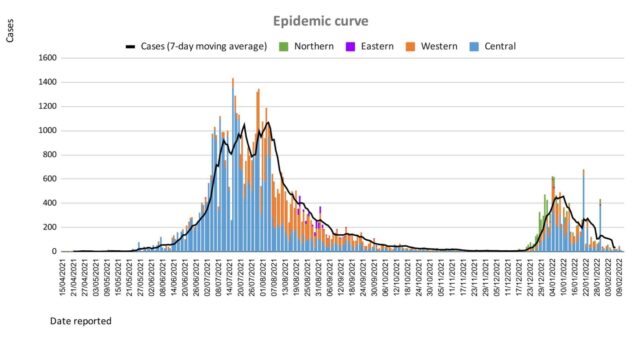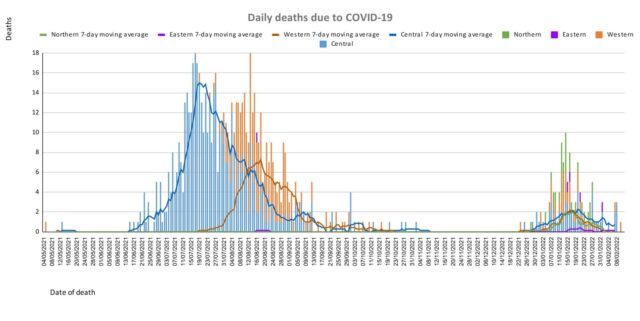COVID-19 Situation Update
Friday 11th February

| Transmission Update:
 Since the last update, we have recorded 60 new cases of which 43 new cases were recorded on 10/02/2022, and 17 new cases in the last 24 hours ending at 8 am this morning. Since the last update, we have recorded 60 new cases of which 43 new cases were recorded on 10/02/2022, and 17 new cases in the last 24 hours ending at 8 am this morning.
Of the 60 cases recorded, 51 cases were recorded in the Central Division; 8 cases were recorded in the Western Division, 1 case was recorded in the Northern Division, and nil case was recorded in the Eastern Division.
Overall, there have been 63,406 cases of COVID-19 recorded in Fiji, with 68% of the cases from the Central Division, 28% of the cases from the Western Division, 1% of the cases from the Eastern Division, and 3% from the Northern Division.
The national 7-day rolling average of cases as of 7th February is 34 daily cases. |
| Deaths:

The curves depict daily COVID-19 deaths by division since May 2021. It indicates a surge from December-end 2021, which peaks by mid-January 2022. The 3rd COVID 19 wave is considered to have started around mid to late December 2021. (Note: Death notifications from the weeks 27/01/22 onwards are still being received, we are currently on week 08/02/2022, therefore the appearance of a downward trend on the graph from week 27/01/22 may not be accurate. There are deaths from the Western Division currently under investigation for the same time period hence, the death rate for the division may increase).
Analysis of Deaths in the Third Wave
Table 1: Death rates by Division
| Division |
Total COVID Deaths |
Deaths per 100,000 |
| Central |
57 |
14.2 |
| Western |
34 |
9.5 |
| Northern |
28 |
20.0 |
| Eastern |
4 |
10.4 |
An analysis of the 123 deaths recorded in the third wave show that, while the Central Division has the highest absolute number of deaths, the Northern Division has the highest rate of death when adjusted for population. (Note: There are deaths currently being investigated from the Western Division for the same time period, therefore the rate for the division may increase).
Table 2: Deaths by Age Group
| Age Group |
Total Deaths |
Deaths per 100,000
population |
| 0 – 9 |
5 |
2.7 |
| 10-19 |
2 |
1.3 |
| 20-29 |
3 |
2.1 |
| 30-39 |
3 |
2.2 |
| 40-49 |
5 |
4.8 |
| 50-59 |
17 |
18.7 |
| 60-69 |
25 |
48.1 |
| 70-79 |
38 |
169.6 |
| 80-89 |
21 |
373.2 |
| 90-99 |
4 |
769.2 |
For the 123 deaths in the third wave, the death rate adjusted per 100,000 population, has been highest in age groups 50 and onwards. There were 7 deaths below the age of 19 years, 6 out of the 7 children had significant pre-existing medical conditions, and one child had no known underlying medical condition.
Table 3: Deaths by Vaccination Status
| Age Cohort |
Total COVID deaths |
Total Vaccinated/
Unvaccinated |
Deaths per 100,000 Vaccinated Population |
Deaths per 100,000 Unvaccinated Population |
| >18 |
116 |
51/65 |
8.8 |
149.2 |
| 15-17 |
1 |
0/1 |
0 |
6.6 |
| 12-14 |
1 |
0/1 |
0 |
2.5 |
Out of 123 COVID -19 deaths reported in the third wave, five deaths were in the population not eligible for vaccination (under age 12). An analysis of the 118 deaths in the vaccine-eligible population reflected, that when adjusted per 100,000 population, for fully vaccinated (received 2 doses) and unvaccinated/not fully vaccinated (received 0 doses or only 1 dose) adults in Fiji, a death rate of 8.8 per 100,000 population for fully vaccinated adults and 149.2 for unvaccinated adults was exhibited. This means that unvaccinated adults in Fiji have been dying at a rate 16.9 times higher than fully vaccinated adults during the current COVID-19 wave. Individuals of the 12-17 age group who died were not vaccinated. There have been no COVID-19 deaths in individuals who received a booster (3rd dose) of the vaccine.
New deaths to report
There are 3 new COVID-19 deaths to report from 7th – 10th February 2022.
The first COVID-19 death to report is of a 74-year-old male from the Western Division, who died at home on 07/02/2022. He was not vaccinated.
The second COVID-19 death to report is of an 86 year-old male from the Central Division, who was admitted at the CWM hospital on 27/01/2022. Sadly, he died on 08/02/2022 and was not vaccinated.
The third COVID-19 death to report is of a 78-year-old female from the Western Division, who died at home on 10/02/2022. She had pre-existing medical conditions and was fully vaccinated.
There has been a total of 819 deaths due to COVID-19 in Fiji. Please note that due to the time required by clinical teams to investigate, classify and report deaths, a 4-day interval is given to calculate the 7 days rolling average of deaths, based on the date of death, to help ensure the data collected is complete before the average is reported. Therefore, as of February 7th, 2022, the national 7 days rolling average for COVID-19 deaths per day is 1.0, with a case fatality rate of 1.29%.
We have recorded 859 COVID-19 positive patients who died from other serious medical conditions unrelated to COVID-19; their doctors determined that COVID-19 did not contribute to their deaths, therefore these are not classified as COVID-19 deaths. |
| Hospitalization:
There is a sustained downward trend in daily hospitalizations. Using the WHO clinical severity classification, a greater percentage, 64% (n=16) of the admissions of COVID-19 positive patients are categorised as asymptomatic and mild, 24% (n=6) are categorised as moderate and 12% (n=3) as severe with nil case in the critical category. Anyone admitted to the hospital is tested before admission, therefore, a significant number of people are admitted to the hospital for non-covid health conditions, but incidentally, test positive due to the high amount of transmission in the community. The number of people being admitted because of COVID-19 remains low. |
| Testing:
179 tests have been reported for February 10th, 2022. Total cumulative tests since 2020 are 494,144 tests. The 7-day daily test average is 166 tests per day or 0.2 tests per 1,000 population.
The national 7-day average daily test positivity is 17.2%. The high positivity rate is an indication of widespread community transmission. |
Public Advisory:
Vaccination
We have noted how difficult it is to increase our vaccination coverage for the last 8% of our adult population, despite the increased risk of severe outcomes in this group. While we will continue to do our part to promote and deploy vaccines, we need community support to sustain the impact of our efforts especially to the vulnerable within this 10%. It is a grave concern that we continue to receive requests for vaccine exemption from persons with medical comorbidities, especially NCDs; their medical condition is an indication for vaccination, and granting the exemption is not an option for any qualified medical person.
During this third wave, unvaccinated deaths in the vaccine-eligible population are occurring at 17 times the rate of vaccinated deaths. This strongly indicates that many of the unvaccinated deaths in the vaccine-eligible population were preventable. I strongly urge anyone who hasn’t been vaccinated to get vaccinated now because COVID-19 is here to stay, and Omicron will not be the last variant. And if you are vaccinated, but know someone who isn’t, please also encourage them to protect themselves by getting vaccinated.
The booster dose program began at the end of November 2021.As of February 11th, 88,816 individuals have so far received booster doses of the Moderna and 35 individuals have received the Pfizer booster COVID-19 vaccine. For the month of February, a further 175,558 have become eligible for booster doses. We are targeting to cover all these eligible individuals in the days ahead. Please come forward to get your booster (3rd dose) vaccine if you are aged 18 or over and it has been at least 5 months since your second dose.
Leptospirosis, typhoid fever, and dengue fever
With the recent heavy rains and flooding in parts of Fiji we expect that there will be an increase in these endemic climate-sensitive diseases. After the recent floods, we are starting to see more people admitted for leptospirosis to our hospitals in the Western Division and the intensive care unit at Lautoka Hospital. Leptospirosis is caused by bacteria that infects and causes illness in some animals and humans. It spreads to humans through the urine of infected animals such as cows, pigs, rats, and dogs. You may become infected if your skin is exposed to the urine of infected animals, which may happen when wading through floodwaters or in mud; and you also may get infected after consuming food or drink that has been contaminated with infected animal urine. People of any age can get leptospirosis, but most often it is found in young adults, and in some cases causes severe disease and death.
Please seek medical care if you have recently had contact with floodwaters or mud and develop the following symptoms: fever, muscle pain, headache. You may also have red eyes, loss of appetite, nausea/vomiting, dizziness, or feel weak. Leptospirosis can be treated with appropriate antibiotic medications prescribed by a doctor if treatment is sought early. Danger signs for severe leptospirosis include shortness of breath, coughing blood, chest pain, yellow eyes/skin (jaundice), signs of bleeding (including unexplained bruising), decreased urination, difficulty staying awake. Severe leptospirosis is life-threatening, and anyone with these symptoms must be taken to the hospital immediately.
To prevent leptospirosis please avoid wading or swimming in flooded waters, wear shoes when walking outside, and keep all food and drink covered and away from rats.
The Ministry of Health and Medical Services has convened the Communicable Disease Committee, which will assist the Divisional Command Centres in responding to cases of leptospirosis, typhoid, and dengue fever, including raising awareness amongst the public and providing refresher training for medical professionals in primary care for early diagnosis and treatment.
Last Updated on 2 years by Publishing Team



